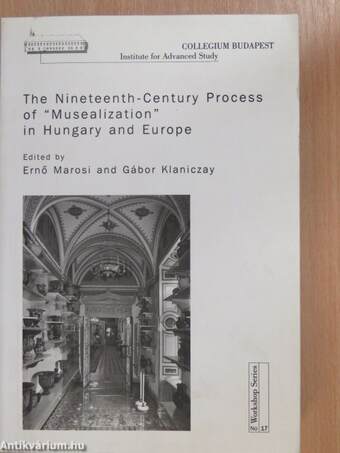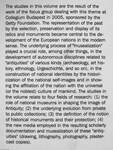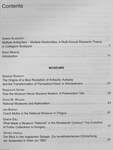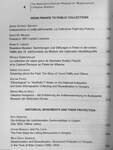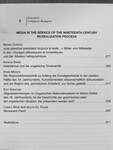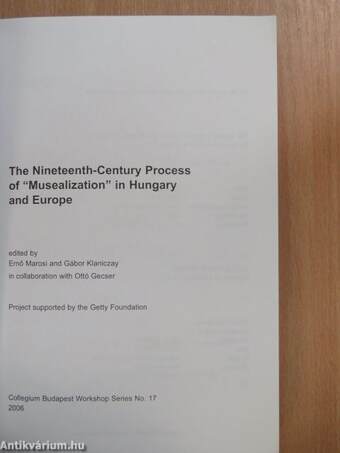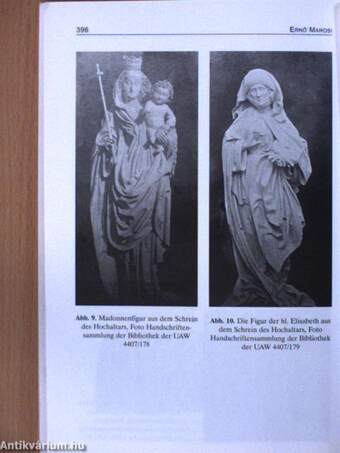1.060.428
kiadvánnyal nyújtjuk Magyarország legnagyobb antikvár könyv-kínálatát

VISSZA
A TETEJÉRE
JAVASLATOKÉszre-
vételek
The Nineteenth-Century Process of "Musealization" in Hungary and Europe
| Kiadó: | Collegium Budapest |
|---|---|
| Kiadás helye: | Budapest |
| Kiadás éve: | |
| Kötés típusa: | Ragasztott papírkötés |
| Oldalszám: | 408 oldal |
| Sorozatcím: | Collegium Budapest Workshop Series |
| Kötetszám: | 17 |
| Nyelv: | Angol Német |
| Méret: | 21 cm x 15 cm |
| ISBN: | 963-9293-10-5 |
| Megjegyzés: | Néhány fekete-fehér fotóval. További kapcsolódó személyek a kötetben. Néhány olasz és francia nyelvű fejezettel. |
naponta értesítjük a beérkező friss
kiadványokról
naponta értesítjük a beérkező friss
kiadványokról
Fülszöveg
The studies in this volume are the result of the
work of the focus group dealing with this theme at
Collegium Budapest in 2005, sponsored by the
Getty Foundation. The representation of the past
by the selection, preservation and display of its
relics and monuments became central to the de-
velopment of the European nations in the modern
sense. The underlying process of "musealization"
played a crucial role, among other things, in the
development of autonomous disciplines related to
"antiquities" of various kinds (archaeology, art his-
tory, ethnology, Urgeschichte, and so on), in the
construction of national identities by the histori-
cization of the national self-images and in show-
ing the affiliation of the nation with the universal
(or the noblest) culture of mankind. The studies in
the volume relate to four fields of research: (1) the
role of national museums in shaping the image of
Antiquity; (2) the underlying evolution from private
to public collections;... Tovább
Fülszöveg
The studies in this volume are the result of the
work of the focus group dealing with this theme at
Collegium Budapest in 2005, sponsored by the
Getty Foundation. The representation of the past
by the selection, preservation and display of its
relics and monuments became central to the de-
velopment of the European nations in the modern
sense. The underlying process of "musealization"
played a crucial role, among other things, in the
development of autonomous disciplines related to
"antiquities" of various kinds (archaeology, art his-
tory, ethnology, Urgeschichte, and so on), in the
construction of national identities by the histori-
cization of the national self-images and in show-
ing the affiliation of the nation with the universal
(or the noblest) culture of mankind. The studies in
the volume relate to four fields of research: (1) the
role of national museums in shaping the image of
Antiquity; (2) the underlying evolution from private
to public collections; (3) the definition of the notion
of historical monuments and their protection; (4)
the new media employed in the resulting scholarly
documentation and musealization of these "antiq-
uities" (drawing, lithography, photography, plaster-
cast copies). Vissza
Témakörök
- Idegennyelv > Idegennyelvű könyvek > Többnyelvű könyvek
- Művelődéstörténet > Kultúra > Története
- Művelődéstörténet > Intézményei > Múzeumok
- Művelődéstörténet > Átfogó művek, tanulmányok
- Néprajz > Egyéb
- Művészetek > Művészettörténet általános > Múzeumok, képtárak > Magyar > Egyéb
- Művészetek > Művészettörténet általános > Múzeumok, képtárak > Külföldi > Európai
- Művészetek > Művészettörténet általános > Idegen nyelv > Egyéb
- Történelem > Idegennyelvű > Angol
- Történelem > Egyéb
- Régészet > Egyéb
Megvásárolható példányok
Nincs megvásárolható példány
A könyv összes megrendelhető példánya elfogyott. Ha kívánja, előjegyezheti a könyvet, és amint a könyv egy újabb példánya elérhető lesz, értesítjük.



